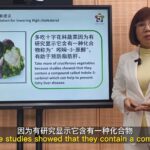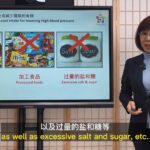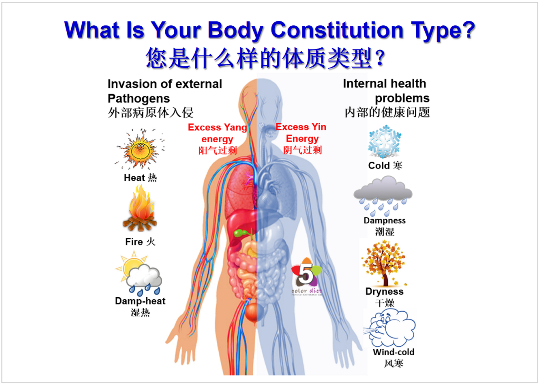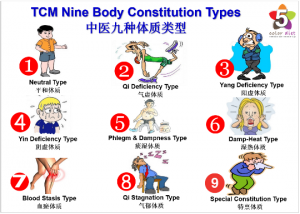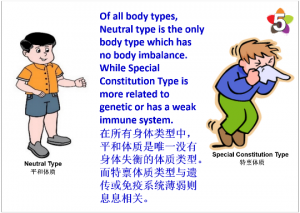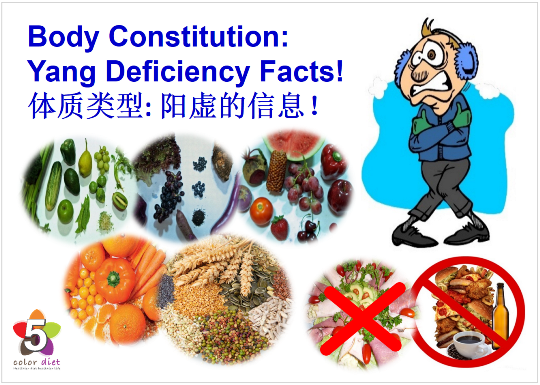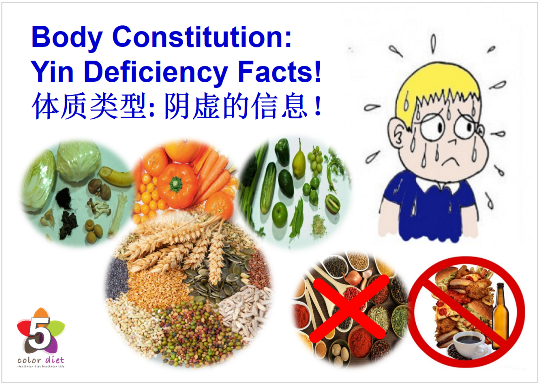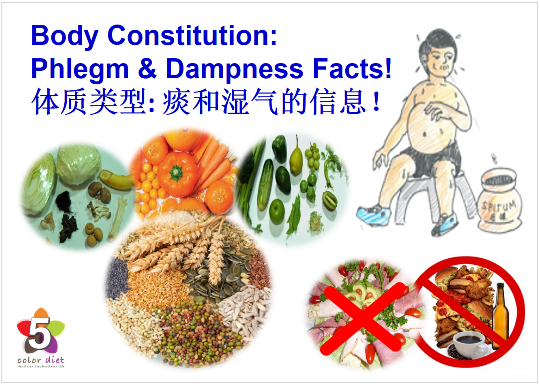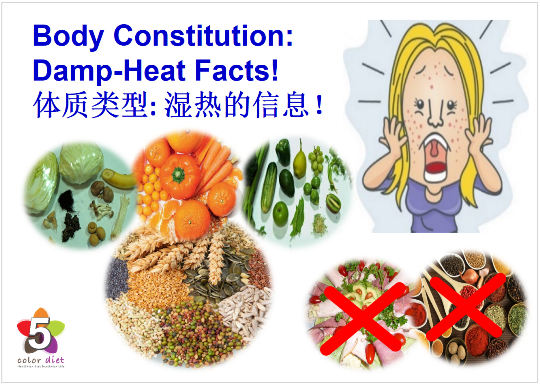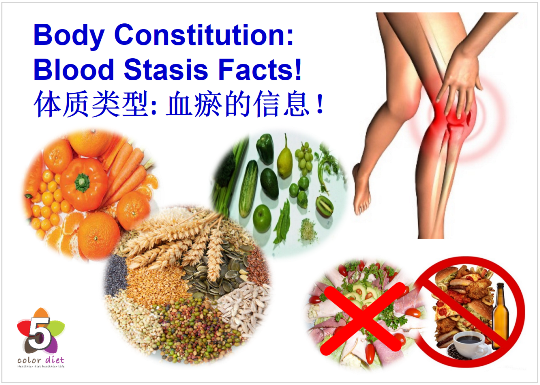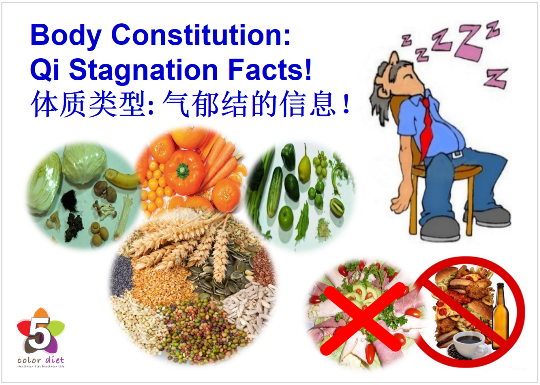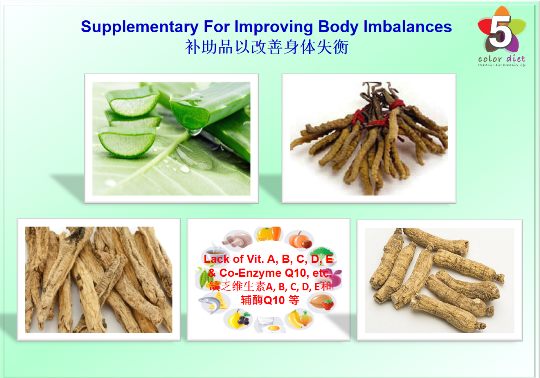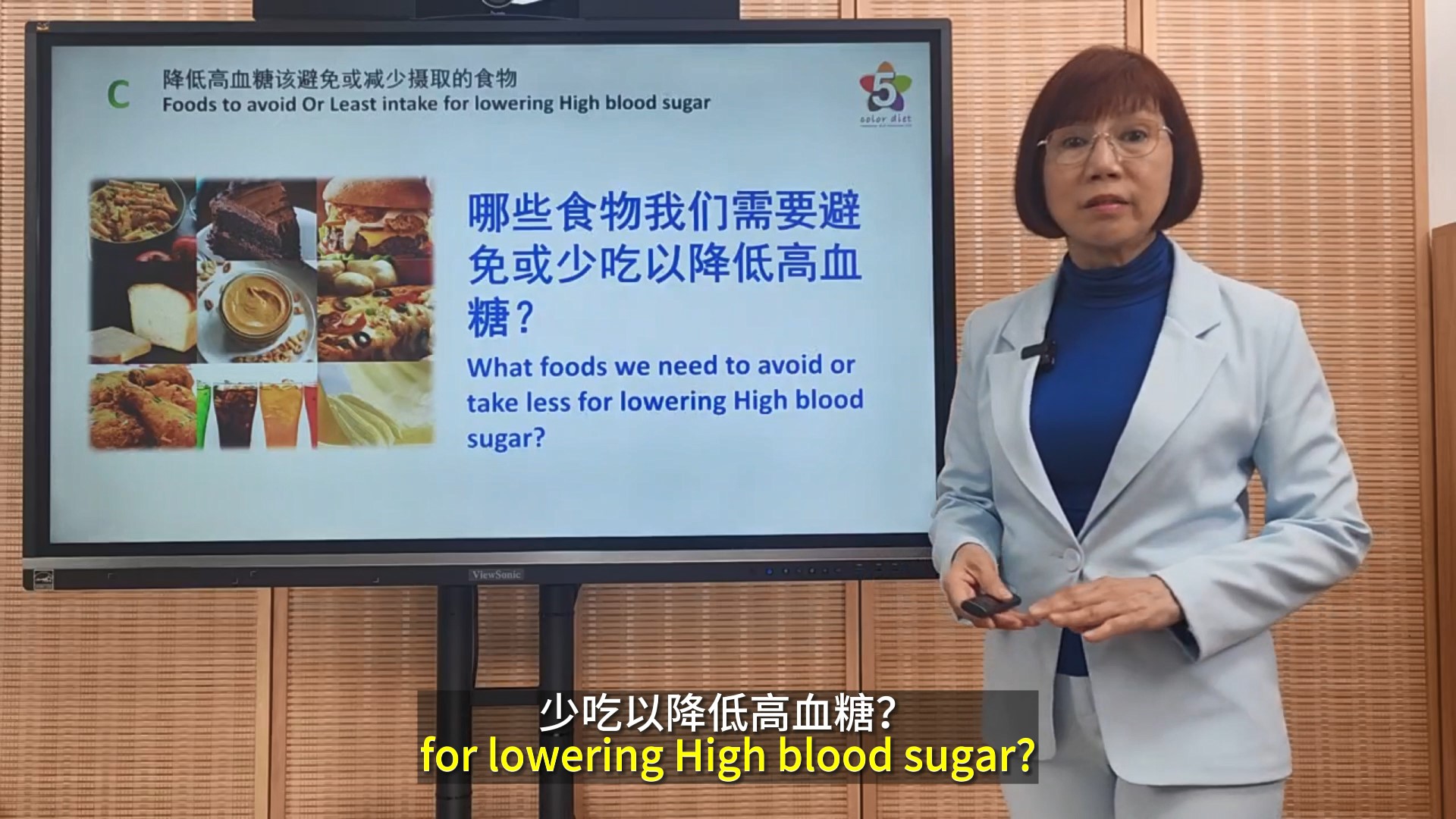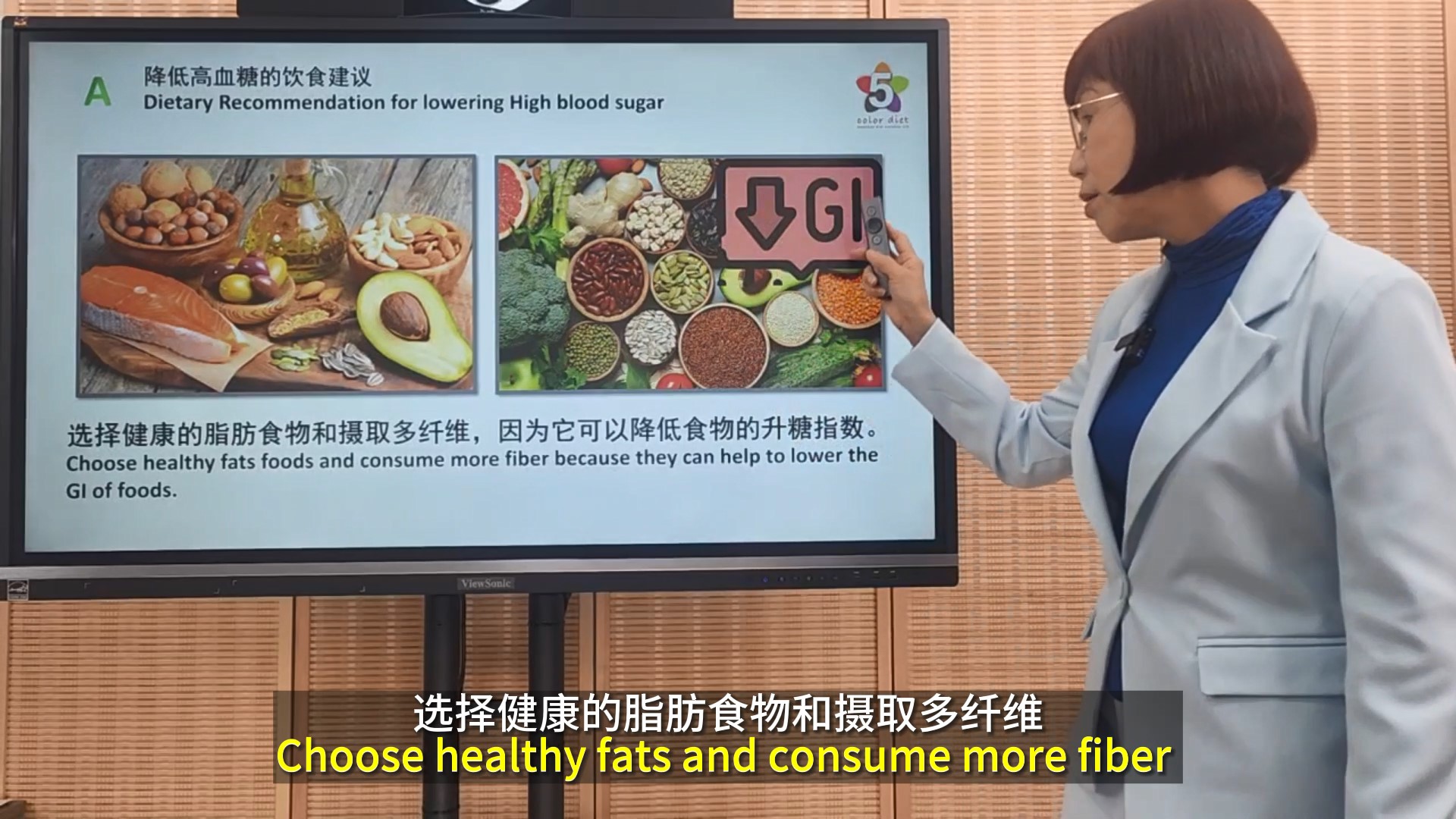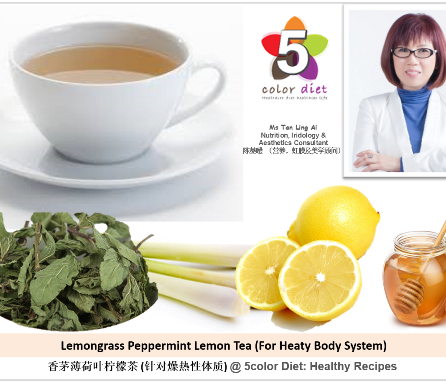
Body Constitution Types And Right Food Diet Overview
Yin and Yang, a nutshell description of what Western physiology calls “homeostasis,” is the basis for all manifestation. Keeping healthy is a balancing act between excess & deficiency. But if we do not rectify our body imbalances, they will cause health problems to other related organs as well.
Traditional Chinese Medicine (TCM) claims that due to inherited and acquired influences, each of us has some uniqueness in regarding to structural, physiological & psychological aspects. These individual characters combine to form body constitution that determines how we live, our susceptibility to pathogens & diseases development. Constitution formation is affected by a variety of inherited and acquired factors:
(1) Gender: Men and women have some physiological differences, in Traditional Chinese Medicine (TCM) terms, men are more rely on Qi (vital energy), while women are more rely on blood.
(2) Age: Our body’s structures, functions & metabolism change as we age.
(3) Mental State: Mental state influences the activities of internal organs which can alert the body constitution.
(4) Living Environment: Different geographic regions lead to specific climates, foods, diet, living habits & these factors become the primary concerns in Traditional Chinese Medicine (TCM) consultations.
According to the China Association for Traditional Chinese Medicine (CACM), body constitution can be divided into nine types:
| Types of Body Constitution | Description |
| Neutral Type | • Individuals have a strong physique, stable emotional or mental state & feel optimistic.
• Their complexion & hairs are lustrous, bright eyes, proper senses of smell & taste, red & moisture lips, full of energy, good appetite, good sleeping pattern and normal bowel movements. • They are adaptable to environmental changes. |
| Qi Deficiency Type | • Individuals tend to have flabby muscles, are introvert & timid in personality.
• They have a feeble voice, shortness of breath, fatigue, catching cold or flu easily & sweating. • They are sensitive to environmental changes. • Since individuals are relatively weak in immune functioning, it usually takes a longer time for them to recover from illnesses. |
| Yang Deficiency Type | • Individuals tend to have flabby muscles, are quiet and introvert in personality.
• They have cold hands & feet, cold feeling in stomach, sensitive to low temperatures or noises, sleepiness and discomfort after eating cold foods. • They often feel uncomfortable in windy, cold & humid environments. |
| Yin Deficiency Type | • Individuals usually have a thin physique, are outgoing & impatient in personality.
• They like to complain about warm palms & soles, mouth dryness, dry nose, preference for cold drinks, dry stools or constipation. • They often feel uncomfortable in hot & dry environments. |
| Phlegm & Dampness Type | • Individuals are either with a normal or thin physique, they tend to be irritable & short-tempered.
• They often present with an oily face that erupts acne or pimple frequently, a bitter or strength taste in the mouth, fatigue or heaviness of the body, uncompleted feeling after defecation or dry stools, yellow urine, excess vaginal discharges in female & wet scrota in male. • They are sensitive to humid & hot environments especially in late summer or early autumn. |
| Damp-Heat Type | • Individuals tend to be impatient and forgetful.
• They often present with a dull complexion, spots on the face, dark-red lips, dark circles under eyes, lusterless or rough skin, bruises on the body surface & varicose veins. • They often feel uncomfortable in cold environments. |
| Blood Stasis Type | • Individuals are usually overweight, they have a mild temper, steady & patient personalities.
• They often present with oily face, sticky or sweet taste in the mouth, excessive throat secretion, sweating, chest stuffiness & preference for sweet and greasy foods. • They often feel uncomfortable in humid & rainy environments. |
| Qi Stagnation Type | • Individuals are mostly thin, tend to be emotional unstable, melancholy or suspicious.
• They often present with a depressed mood, being nervous or anxious, timid, frequent sighing & heart palpitations. • They respond relatively poor to stressful situations, especially in winter, autumn & rainy days. |
| Special Constitution Type | • Individuals usually have inborn weakness, they are very sensitive to drugs, foods, smells, pollen or other environmental allergens.
• They often develop nasal congestion, sneezing, runny nose, panting, wheals, itchiness & even purple spots or patches under the skin. • They respond relatively poor to external influences & their health problems can easily be induced by seasonal changes. |
Of all body constitution types, Neutral type is the only body constitution type which has no body imbalance unless their diet are unhealthy or affected by environmental factors eg: air pollution, heavy metals & smoking, etc. While Special Constitution Type is more related to genetic or has a weak immune system.
Body constitution can vary from person to person, some are strong, some are weak, some tend to be heat & some tend to be cold. Due to body constitutional differences, bodily disharmonies vary from person to person & therefore will cause complicated health problems. In actual fact, it is hard to classify into one type individually as most individuals belong to mixed body constitution type like Yin deficiency & Damp-heat, Qi deficiency & Dampness or Qi stagnation & Blood stasis, etc. Identifying your body constitution type allows you to make better choices about what to eat & how to live. Consulting Chinese Physician or health expert is the best way to know your body constitution types.
Reference: Food Sources’ Energies & Flavours Facts
-
Body Constitution Type: Qi Deficiency Facts
Qi Deficiency indicates that there is not enough Qi to perform a required function in the body. The Lungs and the Spleen are often affected in Qi Deficiency because of their important role in Qi production but any organ can be affected. People with Qi deficiency tend to seek out sweet foods.
Pattern Description Causes Of Qi Deficiency ● Emotional disorders eg: anxiety, depression, grieving or sadness, stress & worry, etc. Over-thinking and worry may weaken the Spleen & lead to Spleen-Qi deficiency. ● Illnesses or any chronic diseases will tend to weaken the Spleen & lead to Spleen-Qi Deficiency. This is the reason why Dampness & Phlegm are a frequent consequence of chronic diseases, as Spleen-Qi is weakened and this leads to the formation of Dampness or Phlegm.
● Excessive consumption of cold foods like iced drinks, raw meat, salads or white/ tan and brown fruits & vegetables.
● Irregular eating, lack of appetite or under-eating will cause Deficiency of the Spleen & Stomach.
● Malnutrition & weak immune system, etc.
● Old age.
● Prolonged exposure to dampness, such as humid climate, can weaken the Spleen & lead to Spleen-Qi deficiency.
● Weak immune system, etc.Symptoms Of Qi Deficiency Abdominal distension, bloatedness after meals, chest tightness, dizziness, easy bruising, easy sweating, edema, fatigue, feeble voice, frequent urination, heart palpitations, lack of energy in the limbs, menstrual disorders, poor appetite, prone to cold or flu, sensitive to environmental changes, short of breath, sloppy stools & weak muscles, etc. Tongue: Teeth marks on sides of tongue with white coating. Related Health Problems Of Qi Deficiency (Main related organs: Heart, Kidneys, Lungs & Spleen) Adrenal fatigue, cardiovascular problems, chronic fatigue syndrome, diabetes & hypoglycemia, digestive problems, depression, eating disorders, edema, haemorrhage, headaches, hemorrhoids, hormones imbalance, menstrual disorders, obesity, pancreatitis, stress (emotional & physical), weak muscles & immune system, etc. Recommended Food Sources For Improving Body Imbalance Related To Qi Deficiency ● Bean, Nuts & Seeds: Black beans, chick peas, chestnuts, fava beans, kidney beans, lotus seeds & walnuts, etc. ● Fruits: Dates, cherries, figs, stewed fruits, sugarcane, especially most green/ orange & yellow color fruits, etc.
● Grains: Cooked whole grains (Eg: amaranth, buckwheat, cereals, oats, brown rice, millet & quinoa), hulled wheat, roasted barley, etc.
● Herbs & Spices: Black pepper, cinnamon, garlic, ginger, fennel, nutmeg, onions & turmeric, etc.
● Meat & Seafood: Fish (Eg: Anchovy, catfish, eel, mackerel, perch & tuna, etc). In moderation for beef, chicken, duck & mutton, etc.
● Vegetables: Carrots, corn, green peas, leeks, mushrooms, parsnips, pumpkin, sweet potatoes, turnips, yam, zucchini especially most green/ orange & yellow color vegetables, etc.
● Others: Blackstrap molasses, maltose, rice syrup and Teas (Eg: cinnamon, ginger, fennel & nutmeg, etc).
● Food diet should comprise of Proteins only 10-20%, Complex carbohydrates 40-60% like grains and starchy root vegetables & Cooked vegetables 30-40%.
Foods To Avoid Or Least Intake For Improving Body Imbalance Related To Qi Deficiency ● Alcohol, caffeine beverages, carbonated beverages, citrus fruits, cold or raw foods (Eg: iced drinks, salads or white/ tan & brown fruits & vegetables), dairy products except yogurt, fried or greasy foods, processed foods, seaweed, spinach, sprouts, soybean products, tomatoes, wheat products & refined sugars (Eg: biscuits, cakes & pastries), etc. ● Avoid smoking & stress.
-
Body Constitution Type: Yang Deficiency Facts
Yang represents the energy that is responsible for warming & activating bodily functions. When this energy is depleted your body begins to slow down, displaying signs of under activity & sensations of coldness.
Pattern Description Causes Of Yang Deficiency ● Caused by Cold which can arise from external factors (eg: cold weather & air-conditioned environment). ● Emotional disorders eg: anxiety, depression, grieving or sadness & worrisome, etc.
● Excessive exercise or physical overwork.
● Excessive consumption of too much cold foods like iced drinks, salads or white/ tan and brown fruits & vegetables.
● Weak digestion, insufficient nutrition or poor eating habits, etc.Symptoms Of Yang Deficiency Anemia, cold limbs, difficult to lose weight, depression, diarrhea, difficult urination, edema, fatigue, feel cold or discomfort in stomach after taking cold drinks or foods, insomnia, joints pain, menstrual disorders, sensitive to cold, humid & windy environments or noises, short of breath, sleepiness, sluggish bowel movements, soreness or cold sensation in the knees & lumbar regions, etc. Tongue: Bulky, moist with white coating. These symptoms become worse in cold environments & more common as we age. Related Health Problems Of Yang Deficiency (Main related organs: Heart, Kidney & Spleen) Aching joints & muscles, adrenal insufficiency, anemia, chronic lower back pain, chronic fatigue syndrome, depression, difficult urination, diarrhea, edema, excess mucus, hypothyroidism, impotence, infertility, loss of appetite, low blood pressure, low libido, menstrual disorders, nephritis, obesity, poor blood circulation & sexual dysfunction, etc. Recommended Food Sources For Improving Body Imbalance Related To Yang Deficiency ● Bean: Black beans, black sesame seeds, chestnuts, chick peas, pistachios & walnuts, etc. ● Fruits: All berries, dates, stewed fruits, especially most dark green/ red/ black/ purple/ blue/ orange & yellow color fruits, etc.
● Grains: Cooked grains, hulled wheat, oats & roasted barley, etc.
● Herbs & Spices: Black pepper, coriander, cinnamon, cloves, fennel, fenugreek, garlic, ginger, nutmeg, onions, parsley, rosemary, spring onions, star anise & turmeric, etc.
● Meat & Seafood: All seafood. Moderation for white & red meat etc.
● Vegetables: Carrots, chives, green peas, leeks, parsnips, pumpkin, sweet potatoes, turnips, yam, especially most dark green/ red/ black/ purple/ blue/ orange & yellow color vegetables, etc.
● Others: Soups & Teas (Eg: Cinnamon, fennel, fenugreek, ginger, nutmeg, rosemary & turmeric, etc). Moderation for blackstrap molasses, maltose & rice syrup, etc.
● Food diet should comprise of Proteins only 10-20%, more on Complex carbohydrates like grains and starchy root vegetables & Cooked vegetables 30-40%.
Foods To Avoid Or Least Intake For Improving Body Imbalance Related To Yang Deficiency ● Alcohol, caffeine beverages, carbonated beverages, citrus fruits, cold or raw foods (Eg: iced drinks, salads or white/ tan & brown fruits & vegetables), dairy products except yogurt, fried or greasy foods, glutinous rice, peanuts, processed foods, salt, seaweed, spinach, sprouts, soybean products, tomatoes, vinegar, wheat products & refined sugars (Eg: biscuits, cakes & pastries), etc. ● Avoid smoking & stress.
-
Body Constitution Type: Yin Deficiency Facts
Yin represents the energy that is responsible for moistening & cooling bodily functions. When this energy is depleted your body begins to show signs of “heatiness”.
Pattern Description Causes Of Yin Deficiency ● Chronic dehydration. ● Emotional disorders eg: anxiety, depression, grieving or sadness & worrisome, etc.
● Excessive exercise or physical overwork.
● Frequent high fevers.
● In women, childbirth can be the cause especially if you had too many pregnancies.
● Long-term Blood deficiency include blood loss due to heavy menses, trauma, surgery or a diminished blood production.
● Medications.
● Overexposure to the sun, radiation & pollution.
● Smoking.
● Unhealthy diet or bad eating habits, etc.
Symptoms Of Yin Deficiency Constipation & dry stools, dizziness, dry cracked lips, dry mouth, dry & itchy skin, excessive urine, fatigue, feel uncomfortable in hot & dry environments, heartburn, heat sensation in the palms & soles, hot flushes, insomnia, menopause syndrome, night perspiration, nocturnal emission, preference for cold drinks, prone to colds, sore throat, stiff & creaking joints, tidal fever, tinnitus, toothache & vivid dreams, etc. Tongue: Red color with little coating. Most individuals will have some weakness of both knees and sore at the lower back. Related Health Problems Of Yin Deficiency Anxiety disorders, cataracts, fatigue, hepatitis, high cholesterol, high blood pressure, hyperthyroidism, insomnia, joint stiffness, menopause syndrome, neurasthenia, night blindness, poor memory, reflux, tinnitus, vision impairment & some chronic health problems, etc. Recommended Food Sources For Improving Body Imbalance Related To Yin Deficiency ● Beans: All nuts & seeds, beancurd, bean sprouts, adzuki beans, black beans, mung beans, miso paste & tempeh, etc. ● Fruits: Apples, banana, coconut, goji berries, grapes, melons, mulberries, peaches, pears, plums, pomegranate, raisins, especially most green/ white/ tan & brown color fruits, etc.
● Grains: Barley, Chinese barley, millet, oats, wheat & white rice, etc.
● Herbs & Spices: American ginseng, Cordyceps, Dan Sheng, mulberry leaves & wheatgrass, etc.
● Meat & Seafood: All seafood & white meat.
● Vegetables: Beets, black fungus, cabbage, carrots, celery, kelp, lettuce, lily bulbs, lotus root, mushrooms, pumpkin, seaweed, spinach, string beans, sweet potatoes, tomatoes, wheatgrass, white fungus, zucchini, especially most green/ white/ tan & brown color vegetables, etc.
● Others: Blackstrap molasses, honey, marmite, vegemite, dairy products in moderation (Eg: cheese, eggs, milk Except yogurt), healthy oils (Eg: almond oil, flaxseed oil, olive oil) and Teas (Eg: Chinese barley, mulberry leaves & peppermint leaves), etc. Advisable to drink water, fruit juices & soups regularly.
● Food diet should comprise of Proteins only 10-20%, more on Complex carbohydrates like grains and starchy root vegetables & Cooked vegetables 40%.
Foods To Avoid Or Least Intake For Improving Body Imbalance Related To Yin Deficiency ● Alcohol, caffeine beverages, carbonated beverages, citrus fruits, pickles, pungent herbs (Eg: Basil, capsicum, cinnamon, cloves, garlic, ginger, horseradish, leeks, onions, shallots, turmeric), red meat, shrimps, spicy foods & vinegar, etc. ● Avoid smoking & stress.
-
Body Constitution Type: Phlegm & Dampness Facts
Dampness arises from the inability of the digestive system to transport & transport fluids, or from the body being overwhelmed by external damp from the environment, (damp environments or damp-producing foods). It can also arise from response to an illness, or from the overuse of medication that promotes Dampness, such as certain antibiotics. Phlegm is seen as a condensed form of Dampness.
Pattern Description Causes Of Phlegm & Dampness ● A history of bad eating habits, including eating unhealthy foods, eat too fast or irregular eating habits. ● A series of acute illnesses or a long chronic illness.
● Excessive sexual activity.
● Intake of too much cold foods like iced drinks, salads or white/ tan and brown fruits & vegetables.
● Lack of exercise.
● Aging.
● Overexposure to cold humid weather or air-conditioned areas.
● Sedentary lifestyle.
● Excessive exercise or physical overwork.
● Worrying too much, etc.
Symptoms Of Phlegm & Dampness Abdominal distension, anxiety, chest stuffiness, dizziness, excessive mucus, faintness, fatigue, feel uncomfortable in humid & rainy environments, heaviness of the head & body, low energy, muscles twitching, obesity, pale complexion, poor appetite, poor memory, preference for sweet & greasy foods, snoring and trembling, water retention, etc. Tongue: Swollen with white sticky coating. Related Health Problems Of Phlegm & Dampness (Main related organs: Liver, Gall Bladder, Heart, Lung & Large Intestine) Cardiovascular problems, chronic fatigue syndrome, diabetes, digestion problems, emotional disorders, high cholesterol, high blood pressure, memory problems, metabolic syndrome, obesity, ovarian fibroids & cysts, prostate problems, skin allergies, urinary problems, vaginal discharge, water retention, weak lungs, spleen & kidneys system, etc. Recommended Food Sources For Improving Body Imbalance Related To Phlegm & Dampness ● Beans, Nuts & Seeds: Almonds, black beans, chick peas, Chinese almonds, cow peas, fava beans, gingko nuts, hyacinth bean, kidney beans, lotus seeds & red beans, etc. ● Fruits: Berries, dates, figs, lemon peel, loquats, olives, plums, red dates, stewed fruits (Eg: Cherries, grapefruit, kumquats, pears, persimmons), sugar cane, especially most green/ orange & yellow color fruits, etc.
● Grains: Barley, buckwheat, corn, Chinese barley, millet, roasted oats, rye, white rice, etc.
● Herbs & Spices: Basil, black pepper, chillies, cardamom, cloves, fennel, garlic, ginger, horseradish, licorice, lotus leaf, mustard, onions, shallots, tamarind, thyme & turmeric, etc.
● Meat & Seafood: Chicken, black chicken, goose, frog, lean meats, rabbit, quail, seafood & fish (Eg: Anchovy, catfish, eel, mackerel, perch, tuna), etc.
● Vegetables: Alfalfa sprouts, asparagus, bamboo shoots, cabbage, carrots, celery, Chinese yam, corn, cucumber, green peas, kelp, leeks, lily bulbs, mushrooms, mustard greens, parsnips, pumpkin, radish, seaweeds, turnips, water chestnuts, watercress, wax gourd, white fungus, zucchini especially most green/ orange & yellow color vegetables, etc.
● Others: Barley malt, rice syrup, sourdough breads & Teas (Eg: Chrysanthemum, Chrysanthemum leaves, green tea, jasmine flowers, raspberry leaves, rose buds), etc.
● Food diet should comprise of Proteins only 10%, Complex carbohydrates 30-40% like grains and starchy root vegetables & Cooked vegetables 40-50%.
Foods To Avoid Or Least Intake For Improving Body Imbalance Related To Phlegm & Dampness ● Alcohol, avocados, caffeine beverages, carbonated beverages, chocolate, citrus fruits, cold or raw foods (Eg: iced drinks, salads or white/ tan & brown fruits & vegetables), dairy products except yogurt & goat milk products, fried or greasy foods, peanuts, processed foods, red meats, salt, seaweed, soybean products, wheat products & refined sugars (Eg: biscuits, cakes & pastries), etc. Excessive of Vitamin C (Not more than 3,000 mg). ● Avoid smoking & stress.
-
Body Constitution Type: Damp-Heat Facts
In Traditional Chinese Medicine (TCM), dampness is an excess of the water element & heat is an excess of the fire element. Dampness is associated with water retention or swelling & feelings of heaviness or sluggishness. Damp-Heat individuals have a relatively high metabolism but accumulated too much metabolic wastes inside the body, leading to various heat signs. They need to cool down the body & prevent further accumulation of metabolic wastes.
Pattern Description Causes Of Damp-Heat ● Emotional disorders eg: anxiety, depression, grieving or sadness & worrisome, etc. ● Excessive sexual activity.
● Hot & humid weathers.
● Intake of too much alcohol, dairy products, greasy foods, junk foods, spicy foods & meat, etc.
● Intake of too much cold foods like iced drinks, salads or white/ tan & brown fruits & vegetables.
● Take foods too fast.
● Take too much medications.
Symptoms Of Damp-Heat An aversion to greasy foods, allergies (especially food allergies), anxiety, bitter taste in the mouth, bronchitis, burning diarrhea, dark & yellow urine, constipation, digestive problems, dizziness, excessive vaginal discharges, fatigue, fever, headaches, jaundice, lack of appetite, nausea, obesity, sensitive to hot & humid environments, thirst, sore throat, uncompleted feeling after defecation or dry stools, vomiting, water retention & wet scrota in men, etc. Tongue: Red color with thick & greasy yellow coating. Related Health Problems Of Damp-Heat (Main related organs: Liver, Gall Bladder, Heart, Lungs & Large Intestine) Acute hepatitis, allergies (especially food allergies), anxiety disorders, bronchitis, chronic fatigue syndrome, constipation, eczema, fibromyalgia, gallbladder infections, gallstones, herpes, high blood glucose, high cholesterol, high blood pressure, hyperthyroidism, metabolic disorders, migraine headaches, obesity, poor appetite, Raynaud’s Disease, skin problems, stroke, testicular pain, urinary tract infections, vaginal discharges & water retention, etc. Recommended Food Sources For Improving Body Imbalance Related To Damp-Heat ● Beans, Nuts & Seeds: Almonds, beancurd, bean sprouts, Chinese almonds, green beans, hyacinth beans, kidney beans, lotus seeds, red beans, soybeans, miso paste, tempeh & walnuts, etc. ● Fruits: Banana, cranberries, lemon, loquat, persimmons, watermelon, especially most green/ orange & yellow color fruits, etc.
● Grains: Amaranth, barley, Chinese barley, millet, rice, rye & whole wheat, etc.
● Herbs & Spices: Mulberry leaves and Peppermint leaves.
● Meat & Seafood: duck & all fishes.
● Vegetables: Alfalfa sprouts, amaranth leaves, arugula, asparagus, bamboo shoots, bittergourd, bok choy, broccoli, cabbage, cauliflower, carrots, Chinese cabbage, celery, cucumber, eggplants, kelp, lettuce, lotus root, mushrooms, peas, purslane, radish, spinach, Swiss chard, tomatoes, water chestnuts, watercress, wax gourd, wild rice stems, zucchini especially most green/ orange & yellow color vegetables, etc.
● Others: Coconut oil, flaxseed oil, olive oil and Teas (Eg: Chinese barley, chrysanthemum, chrysanthemum leaves, green tea, mulberry leaves & peppermint leaves), etc.
Food diet should comprise of Proteins only 20%, Complex carbohydrates 20-30% like grains and starchy root vegetables & Cooked vegetables 50%.
Foods To Avoid Or Least Intake For Improving Body Imbalance Related To Damp-Heat ● Alcohol, carbonated beverages, caffeine beverages, cold & raw foods (Eg: iced drinks, raw meat, salads or white/ tan & brown fruits & vegetables), dairy products (Eg: butter, cheese, eggs & milk except yogurt), fried or greasy foods, processed foods, pungent herbs (Eg: basil, capsicum, chili, cinnamon, cloves, garlic, ginger, horseradish, leeks, onions, shallots, turmeric), red meat, refined sugars (Eg: biscuits, cakes & pastries), salt, shrimps, spicy foods, etc. Do not take foods too fast or too many medications. ● Avoid smoking & stress.
-
Body Constitution Type: Blood Stasis Facts
Blood Stasis Syndrome or Stagnation is where the normal flow of Blood has become obstructed. Stagnant Blood can occur in the channels (usually due to trauma), or in the internal organs, mainly in the Liver, Heart, Uterus, Intestines & Stomach. Heat in the Blood also eventually causes blood to stagnate & affect body internal coldness.
Pattern Description Causes Of Blood Stasis ● Abortions or heavy blood loss during childbirth. ● Caused by long term Qi & Blood Deficiencies, or excesses of heat or cold in the body.
● Intake of too much cold foods like iced drinks, salads or white/ tan and brown fruits & vegetables.
● Intra-abdominal surgery, traumatic injury or surgery.
● Intercourse during menstruation.
● In women, advisable not to take cold foods or drinks 1 week before menstruation or during menstruation period.
Symptoms Of Blood Stasis Anxiety, bruising on skin or varicose veins, chronic inflammation of the abdomen, chest & pelvis, clot & dark menstrual blood, dark skin that lacks luster, depression, fatigue, feel uncomfortable in cold environments, headaches, insomnia, menstrual disorders, poor blood circulation, sharp stabbing or cutting pain in the head, eyes, joints or other internal organs, sluggish bowel movements, stiff neck & shoulders, sweat easily, swellings or masses such as non-malignant tumors, cysts and fibroids, vivid dreams, etc. Tongue: purple color possibly with purple spots, red purple color if there is heatiness in the body or blue purple if there is coldness in the body. Related Health Problems Of Blood Stasis Bleedings, breast distension or lumps, chest pain, chronic fatigue syndrome, depression, endometriosis, enlarged liver or spleen, hemoptysis (coughing up blood), hypochondriac (meaning below the ribs) pain, insomnia, irritable bowel syndrome, migraine headaches, menstrual disorders, palpable masses in the abdomen, polycystic ovaries, poor circulation, subcutaneous hematoma (bruising under the skin), thyroid problems, uterine fibroids, growth & tumours in some organs, etc. Recommended Food Sources For Improving Body Imbalance Related To Blood Stasis ● Beans, Nuts & Seeds: Almonds, black beans, chestnuts, Chia seeds, Chinese almonds, flaxseeds, gingko nuts, kidney beans, pine nuts, pumpkin seeds, red beans, walnuts, soybeans, miso paste & tempeh, etc. ● Fruits: Apricot, banana, citrus fruits, hawthorn fruit, lemon, mango, papaya, peach, plum, raisins, sour jujube, sugar cane, especially most green/ orange & yellow color fruits, etc.
● Grains: Amaranth, cereals, oats, quinoa & white rice, etc.
● Herbs & Spices: Alfalfa, basil, Burdock, chives, Dang Sheng, garlic, ginger, licorice, lotus leaf, onions, nutmeg, parsley, rosemary, sage, shallots, turmeric & white pepper, etc.
● Meat & Seafood: Abalone, clams, crab, fish, jellyfish, lean meat & sea cucumber, etc.
● Vegetables: Asparagus, black fungus, broccoli, Brussels sprouts, carrot, celery, Chinese radish, eggplants, kelp, leeks, mushrooms, pumpkin, seaweed, spinach, taro root, yams, zucchini especially most green/ orange & yellow color vegetables, etc.
● Others: Brown sugar, healthy oils (eg: canola oil, olive oil, safflower oil), vinegar and Teas (Eg: chrysanthemum, green tea, lavender flowers & rosebuds), etc.
● Food diet should comprise of Proteins only 10%, Complex carbohydrates 30% like grains and starchy root vegetables & Cooked vegetables 40-60%.
Foods To Avoid Or Least Intake For Improving Body Imbalance Related To Blood Stasis ● Alcohol, all nuts & seeds except those stated in Recommended food sources, caffeine beverages, carbonated beverages, chocolate, cold or raw foods (Eg: iced drinks, salads or white/ tan & brown fruits & vegetables), dairy products (Eg: butter, cheese, eggs & milk except yogurt), fried or greasy foods, grains (Eg: brown rice & millet), processed foods, refined sugars (Eg: biscuits, cakes & pastries), red meat, salt, spicy foods & tomatoes, etc. Excessive of Vitamin C (Not more than 3,000 mg). ● Avoid smoking & stress.
-
Body Constitution Type: Qi Stagnation Facts
This is where the normal movement or flow of Qi is impaired. When Qi stagnates in a particular Organ, there may be pain or impairment of that Organ’s functions. Compared to Blood Stagnation, Qi Stagnation is a moving pain, whereas the pain from Blood Stagnation is fixed in nature.
Pattern Description Causes Of Qi Stagnation ● Emotional disorders eg: anxiety, depression, grieving or sadness & worrisome, etc. ● Environmental toxins eg: polluted air, heavy metals & smoking, etc,
● Hot & spicy foods.
● Poor sleeping patterns.
● Qi stagnation can be due to traumatic injury or internal causes.
● Sedentary lifestyle.
Symptoms Of Qi Stagnation Abdominal distention, anger, anxiety, depression, fatigue, frequent sighing, frustration, fullness in the chest, headaches, heart palpitations, indigestion, insomnia, irritability, menstrual disorders, sluggish bowel movements, stiff neck & shoulders, sweat easily, tenderness around ribs, vivid dreams, etc. Tongue: normal or red tip with thin white coating. Related Health Problems Of Qi Stagnation (Main related organs: Liver, Gall Bladder & Heart) Amenorrhea (Absence of Menstruation), anxiety disorders, breast distension or lumps, chronic fatigue, depression, digestive problems, endometriosis, female infertility, gallstones, gastroenteritis, hepatitis, high cholesterol, insomnia, irritable bowel syndrome, menstrual disorders, migraine headaches, neurosis, Pneumothorax, polycystic ovaries, Raynaud’s Disease, thyroid problems & uterine fibroids, etc. May lead to blood stasis, heat, dampness & phlegm. Recommended Food Sources For Improving Body Imbalance Related To Qi Stagnation ● Beans, Nuts & Seeds: Almonds, beancurd, Chinese almonds, red beans & walnuts, etc. ● Fruits: black dates, cherries, citrus fruits, grapefruits, hawthorn fruit, loquats, red dates, tangerines, tangerine peel, especially most green/ orange& yellow color fruits, etc.
● Grains: Barley, buckwheat, Chinese barley & white rice, etc.
● Herbs & Spices: Basil, caraway seeds, cardamom, cumin, dill, fennel, garlic, ginger, horseradish, mustard seeds, onions, peppers, peppermint leaves & turmeric, etc.
● Meat & Seafood: All fishes.
● Vegetables: Artichokes, asparagus, beets, broccoli, Brussel sprouts, cabbage, carrots, cauliflower, celery, Chinese chives, Chinese radish, lily bulbs, kelp, mustard greens, pickled vegetables, pumpkin, seaweed, sweet potatoes, turnips, watercress, water chestnuts, wheat, yam, zucchini especially most green/ orange & yellow color vegetables, etc.
● Others: Blackstrap molasses, olive oil and Teas (Eg: Chamomile, chrysanthemum, ginger, jasmine flowers, milk thistle, peppermint leaves, rosebuds & saffron), etc.
Food diet should comprise of Proteins only 10%, Complex carbohydrates 30% like grains and starchy root vegetables & Cooked vegetables 40-60%.
Foods To Avoid Or Least Intake For Improving Body Imbalance Related To Qi Stagnation ● Alcohol, all nuts & seeds except those stated in Recommended food sources, caffeine beverages, carbonated beverages, cheese, chocolate, cold or raw foods (Eg: iced drinks, salads or white/ tan & brown fruits & vegetables), dairy products except yogurt, fried or greasy foods, grains (Eg: brown rice & millet), processed foods, raw vegetables juices, refined sugars (Eg: biscuits, cakes & pastries), red meat, salt, spicy foods & tomatoes, etc. ● Avoid smoking & stress.
-
Supplementary For Improving Body Imbalances
● Herbs: Aloe Vera, American Ginseng, Astragalus, Chlorella, Cordyceps, Dan Sheng, Echinacea, Lingzhi, Panax Ginseng, Siberian Ginseng & Spirulina, etc.
● Amino Acids, Vitamins & Minerals: Vitamin A, Vitamin B Complex, Vitamin C with Bioflavonoids, Vitamin D, Vitamin E, Calcium, Co-Enzyme Q10, Essential Fatty Acids, Multi-Enzymes, Multi-Vitamin & Minerals & Probiotics with Prebiotics, etc.Consult health experts’ advice shall you need to take any supplements.
-
Alternative Therapies For Improving Body Imbalances
● Detox your body naturally by using food therapies & natural remedies which will help you to replenish your energy & improve your chronic diseases’ symptoms.
● Exercise minimum 30 minutes at 3 to 5 times weekly will help to promote blood circulation & metabolism which will contribute to a healthy immune system. Do not over exercise because too much exercise can wear you down & create immune system problems.
● Apply meditation 1 to 2 times daily to calm the nerves, emotional mood imbalances & reduce stress, etc.





